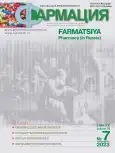Исследование тенденций обеспечения потребности медицинских организаций в пищевых продуктах энтерального питания
- Авторы: Кирпикова К.Е.1, Грицаненко Д.С.1, Ильинова Ю.Г.1, Трофимова Е.О.1
-
Учреждения:
- ФГБОУ ВО Санкт-Петербургский государственный химико-фармацевтический университет Минздрава России
- Выпуск: Том 72, № 7 (2023)
- Страницы: 43-49
- Раздел: Организация и экономика
- URL: https://journal-vniispk.ru/0367-3014/article/view/249798
- DOI: https://doi.org/10.29296/25419218-2023-07-06
- ID: 249798
Цитировать
Аннотация
Введение. Высокая значимость пищевых продуктов энтерального питания (ПЭП) как средств обеспечения нутритивной поддержки (НП) пациентов различного профиля делает актуальным формирование представления о текущем состоянии потребления данного вида продукции в медицинских организациях Северо-Западного федерального округа (СЗФО).
Цель исследования: изучение состояния и тенденций обеспечения потребности медицинских организаций в ПЭП, в том числе источников покрытия этой потребности.
Материал и методы. В качестве источников информации использованы данные о заключенных контрактах за 2016–2021 гг., размещенные в единой информационной системе в сфере закупок, и данные Единого реестра свидетельств о государственной регистрации продукции.
Результаты. В структуре общих закупок ПЭП медицинскими организациями СЗФО за 2016–2021 гг. 43% составили продукты для сипингового (перорального) употребления, 20% – предназначенные для введения через зонд, 37% – для смешанного приема. Превалируют смеси с жидкой формой выпуска и со стандартным функциональным назначением. Доля специализированных (метаболически ориентированных) смесей за весь рассматриваемый период составила 30%. Темпы роста закупок стандартных ПЭП опережали общую динамику специализированных смесей, за исключением ПЭП для больных сахарным диабетом и страдающих дыхательной недостаточностью, что можно связать с развитием эпидемии COVID-19. В 2021 г. объем закупок ПЭП составил 673,6 тыс. упаковок, в 2 раза превысив уровень 2016 г.
Удовлетворение потребности в ПЭП на 85% было осуществлено за счет продукции зарубежного происхождения, на 15% – российского; >⅓ поставленных ПЭП – продукты компании B.Braun (Германия).
Заключение. Снижение рисков при обеспечении потребности в НП пациентов в рамках оказания медицинской помощи обусловливают необходимость преодоления импортозависимости в сфере поставок ПЭП.
Полный текст
Открыть статью на сайте журналаОб авторах
Ксения Евгеньевна Кирпикова
ФГБОУ ВО Санкт-Петербургский государственный химико-фармацевтический университет Минздрава России
Автор, ответственный за переписку.
Email: ksenija.kirpikova@pharminotech.com
ORCID iD: 0000-0002-3230-6413
аспирант кафедры медицинского и фармацевтического товароведения
Россия, 197022, Санкт-Петербург, ул. Профессора Попова, д. 14, лит. АДарья Сергеевна Грицаненко
ФГБОУ ВО Санкт-Петербургский государственный химико-фармацевтический университет Минздрава России
Email: daria.gritsanenko@pharminnotech.com
ORCID iD: 0000-0002-5359-9454
старший преподаватель кафедры медицинского и фармацевтического товароведения
Россия, 197022, Санкт-Петербург, ул. Профессора Попова, д. 14, лит. АЮлия Геннадьевна Ильинова
ФГБОУ ВО Санкт-Петербургский государственный химико-фармацевтический университет Минздрава России
Email: yulia.ilynova@pharminnotech.com
ORCID iD: 0000-0001-9827-3653
кандидат фармацевтических наук, доцент, доцент кафедры медицинского и фармацевтического товароведения
Россия, 197022, Санкт-Петербург, ул. Профессора Попова, д. 14, лит. АЕлена Олеговна Трофимова
ФГБОУ ВО Санкт-Петербургский государственный химико-фармацевтический университет Минздрава России
Email: elena.trofimova@pharminnotech.com
ORCID iD: 0000-0002-4940-9953
доктор фармацевтических наук, профессор, профессор кафедры управления и экономики
Россия, 197022, Санкт-Петербург, ул. Профессора Попова, д. 14, лит. АСписок литературы
- Шестопалов А.Е. Энтеральное питание – основа лечебных мероприятий при различных заболеваниях. Эффективная фармакотерапия. Онкология, Гематология и Радиология, 2010, 1: 16–9.
- Стец В.В., Половников С.Г., Журавлев А.Г., Шестопалов А.Е. Нутритивно-метаболическая коррекция в интенсивной терапии перитонита. Раны и раневые инфекции. 2016; 3 (1): 25–31. DOI: 10.17 650/2408-9613-2016-3-1-25-31.
- Yan X.X., Zhang X., Ai H., Wang D., Song K.Y. Changes of intestinal mucosal barrier function and effects of early enteral nutrition in patients with severe organophosphorus poisoning. Zhonghua Yi Xue Za Zhi. 2019; 99 (6): 442–6. doi: 10.3760/cma.j.issn.0376-2491.2019.06.012.
- Белкин А.А., Лейдерман И.Н., Петриков С.С., Титова Ю.В. Нутритивная поддержка в неврологии и нейрохирургии. В кн.: Хубутия М.Ш., Попова Т.С., Салтанов А.И. (ред.) Парентеральное и энтеральное питание: национальное руководство. Москва: ГЭОТАР-Медиа, 2014; 21: 401–18.
- Бошкоев Ж.Б., Джузумалиева К.С., Алтухова И.Г., Умуралиева М.И., Эсенгулова Ч.Б. Раннее энтеральное питание в комплексе интенсивной терапии. Медицина Кыргызстана. 2018; 5: 41–3.
- Лейдерман И.Н., Грицан А.И., Заболотских И.Б., Крылов К.Ю., Лебединский К.М., Мазурок В.А. и др. Метаболический контроль и нутритивная поддержка у пациентов на длительной искусственной вентиляции легких (ИВЛ). Клинические рекомендации. Анестезиология и реаниматология. 2019; 4: 5–19. DOI: 0.17116/anaesthesiology20190415.
- Parent B., Seaton M., O’Keefe G.E. Biochemical Markers of Nutrition Support in Critically Ill Trauma Victims. J. Parenter Enteral Nutr. 2018; 42 (2): 335–42. doi: 10.1177/0148607116671768.
- Петрова М.В., Крылов К.Ю., Шестопалов А.Е., Сергиенко А.Д., Яковлева А.В., Мурадян К.Р. и др. Особенности проведения энтерального питания у пациентов в длительном бессознательном состоянии. Трудный пациент. 2018; 16 (5): 32–4.
- Lee J.C., Williams G.W., Kozar R.A., Kao L.S., Mueck K.M., Emerald A.D. et al. Multitargeted Feeding Strategies Improve Nutrition Outcome and Are Associated with Reduced Pneumonia in a Level 1 Trauma Intensive Care Unit. J. Parenter Enteral Nutr. 2018; 42 (3): 529–37. doi: 10.1177/0148607117699561.
- Нароган М.В., Рюмина И.И., Грошева Е.В. Базовые принципы энтерального питания недоношенных детей. Российский вестник перинатологии и педиатрии. 2014, 3: 120–8.
- Кирпикова К.Е. Анализ состояния ресурсного обеспечения медицинских организаций Российской Федерации специализированной пищевой продукцией энтерального питания. «Молодая фармация – потенциал будущего», XII всероссийская научная конференция студентов и аспирантов с международным участием (12; 2022; Санкт-Петербург). Сборник материалов конференции=Proceeding of the conference «Молодая фармация – потенциал будущего», 14 марта – 18 апреля 2022 г. Санкт-Петербург: Изд-во СПХФУ, 2022; 1362 [14].
- Сметанина Д.Я. Проблемы идентификации пищевых продуктов энтерального питания в системе государственных закупок. «Молодая фармация – потенциал будущего», XI всероссийская научная конференция студентов и аспирантов с международным участием (11; 2021; Санкт-Петербург). Сборник материалов конференции=Proceeding of the conference «Молодая фармация – потенциал будущего», 15 марта – 23 апреля 2021 г.: в. 2 т. Т.2. Санкт-Петербург: Изд-во СПХФУ, 2021; 450 [22].
Дополнительные файлы













